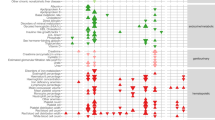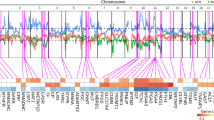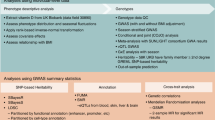Abstract
We live in a health-conscious age — many of us supplement our diet with essential micronutrients through the discretionary use of multivitamin pills or judicious selection of foods that have a health benefit beyond that conferred by the nutrient content alone — the so-called 'functional foods'. Indeed, the citizens of some nations have little choice, with a mandatory fortification policy in place for certain vitamins. But do we ever stop to consider the consequences of an increased exposure to micronutrients? We examine this issue in relation to the B-group vitamin folic acid, and ask whether supplementation with this vitamin could introduce a strong genetic selection pressure — one that has the side effect of increasing the prevalence of some of the most significant, human life-threatening diseases. Are we affecting our genetics — is this a case of human evolution in progress by altering our diet?
This is a preview of subscription content, access via your institution
Access options
Subscribe to this journal
Receive 12 print issues and online access
$189.00 per year
only $15.75 per issue
Buy this article
- Purchase on Springer Link
- Instant access to full article PDF
Prices may be subject to local taxes which are calculated during checkout


Similar content being viewed by others
References
Gillies, P. J. Nutrigenomics: the Rubicon of molecular nutrition. J. Am. Diet. Assoc. 103, S50–S55 (2003).
Muller, M. & Kersten, S. Nutrigenomics: goals and strategies. Nature Rev. Genet. 4, 315–322 (2003).
Kaput, J. Diet–disease gene interactions. Nutrition 20, 26–31 (2004).
Lucock, M. Is folic acid the ultimate functional food component for disease prevention? BMJ 328, 211–214 (2004).
Godfrey, P. S. A. et al. Enhancement of recovery from psychiatric illness by methylfolate. Lancet 336, 392–395 (1990).
Clarke, R. et al. Folate, vitamin B12, and serum total homocysteine levels in confirmed Alzheimer disease. Arch. Neurol. 55, 1449–1455 (1998).
Slattery, M. L., Potter, J. D., Samowitz, W., Schaffer, D. & Leppert, M. Methylenetetrahydrofolate reductase, diet, and risk of colon cancer. Cancer Epidemiol. Biomarkers Prev. 8, 513–518 (1999).
Zhang, S. et al. A prospective study of folate intake and the risk of breast cancer. JAMA 281, 1632–1637 (1999).
Stolzenberg-Solomon, R. Z. et al. Dietary and other methyl-group availability factors and pancreatic cancer risk in a cohort of male smokers. Am. J. Epidemiol. 153, 680–687 (2001).
Butterworth, C. E. Folate status, women's health, pregnancy outcome and cancer. J. Am. Coll. Nutr. 12, 438–441 (1993).
Kamei, T. et al. Experimental study of the therapeutic effects of folate, vitamin A and vitamin B12 on squamous metaplasia of the bronchial epithelium. Cancer 71, 2477–2483 (1993).
Skibola, C. F. et al. Polymorphisms in the methylenetetrahydrofolate reductase gene are associated with susceptibility to acute leukemia in adults. Proc. Natl Acad. Sci. USA 96, 12810–12815 (1999).
Boushey, C. J., Beresford, S. A., Omenn, G. S. & Motulsky, A. G. A quantitative assessment of plasma homocysteine as a risk factor for vascular disease. Probable benefits of increasing folic acid intakes. JAMA 274, 1049–1057 (1995).
Medical Research Council Vitamin Study Group. Prevention of neural tube defects: results of the Medical Research Council Vitamin Study. Lancet 338, 131–137 (1991).
James, S. J. et al. Abnormal folate metabolism and mutation in the methylenetetrahydrofolate reductase gene may be maternal risk factors for Down's syndrome. Am. J. Clin. Nutr. 70, 495–501 (1999).
Dekker, G. A. et al. Underlying disorders associated with severe early onset preeclampsia. Am. J. Obstet. Gynecol. 173, 1042–1048 (1995).
Rajkovic, A., Catalano, P. M. & Malinow, M. R. Elevated homocyst(e)ine levels with preeclampsia. Obstet. Gynecol. 90, 168–171 (1997).
Roberts, D. & Schwartz, R. S. Clotting and hemorrhage in the placenta — a delicate balance. N. Engl. J. Med. 347, 57–59 (2002).
Wong, W. Y. et al. Effects of folic acid and zinc sulfate on male factor subfertility: a double-blind, randomized, placebo-controlled trial. Fertil. Steril. 77, 491–498 (2002).
Friso, S. & Choi, S. W. Gene-nutrient interactions and DNA methylation. J. Nutr. 132, S2382–S2387 (2002).
Duthie, S. J. & Hawdon, A. DNA instability (strand breakage, uracil misincorporation, and defective repair) is increased by folic acid depletion in human lymphocytes in vitro. FASEB J. 12, 1491–1497 (1998).
Lucock, M. et al. A critical role for B-vitamin nutrition in human developmental and evolutionary biology. Nutr. Res. 23, 1463–1475 (2003).
US Food and Drug Administration. Food standards: amendment of standards of identity for enriched grain products to require addition of folic acid. Final rule. Fed. Regist. 61, 8781–8797 (1996).
Lewis, C. J., Crane, N. T., Wilson, D. B. & Yatley, E. A. Estimated folate intakes: data updated to reflect food fortification, increased bioavailability, and dietary supplement use. Am. J. Clin. Nutr. 70, 198–207 (1999).
Isotalo, P. A., Wells, G. A. & Donnelly, J. G. Neonatal and fetal methylenetetrahydrofolate reductase genetic polymorphisms: an examination of C677T and A1298C mutations. Am. J. Hum. Genet. 67, 986–990 (2000).
Munoz-Moran, E. et al. Genetic selection and folate intake during pregnancy. Lancet 352, 1120–1121 (1998).
Nelen, W. L., Steegers, E. A., Eskes, T. K. & Blom, H. J. Genetic risk factor for unexplained recurrent early pregnancy loss. Lancet 350, 861 (1997).
Gris, J. C. et al. Case-control study of the frequency of thrombophilic disorders in couples with late foetal loss and no thrombotic antecedent — the Nimes Obstetricians and Haematologists Study 5 (NOHA5). Thromb. Haemost. 81, 891–899 (1999).
Wouters, M. G. et al. Hyperhomocysteinemia: a risk factor in women with unexplained recurrent early pregnancy loss. Fertil. Steril. 60, 820–825 (1993).
Rosenberg, N. et al. The frequent 5,10-methylenetetrahydrofolate reductase C677T polymorphism is associated with a common haplotype in whites, Japanese, and Africans. Am. J. Hum. Genet. 70, 758–762 (2002).
Botto, L. D. & Yang, Q. 5,10-Methylenetetrahydrofolate reductase gene variants and congenital abnormalities: a HuGE review. Am. J. Epidimiol. 151, 862–877 (2000).
Sohn, K. J., Croxford, R., Yates, Z., Lucock, M. & Kim, Y. I. The effect of the methylenetetrahydrofolate reductase C677T polymorphism on chemosensitivity of colon and breast cancer cells to 5-fluorouracil and methotrexate. J. Natl Cancer Inst. 96, 134–144 (2004).
Eskes, T. K. Homocysteine and human reproduction. Clin. Exp. Obstet. Gynecol. 27, 157–167 (2000).
Ratanasthien, K., Blair, J. A., Leeming, R. J., Cooke, W. T. & Melikian, V. Serum folates in man. J. Clin. Pathol. 30, 438–448 (1977).
Kelly, P., McPartlin, J., Goggins, M., Weir, D. G. & Scott, J. M. Unmetabolised folic acid in serum: acute studies in subjects consuming fortified food and supplements. Am. J. Clin. Nutr. 65, 1790–1795 (1997).
Lucock, M. D., Wild, J., Smithells, R. & Hartley, R. In vivo characterisation of the absorption and biotransformation of pteroylglutamic acid in man: a model for future studies. Biochem. Med. Metab. Biol. 42, 30–42 (1989).
Yates, Z. & Lucock, M. Methionine synthase polymorphism A2756G is associated with susceptibility for thromboembolic events and altered B vitamin/thiol metabolism. Haematologica 87, 751–756 (2002).
Lucock, M. D. et al. Optimisation of chromatographic conditions for the determination of folates in foods and biological tissues for nutritional and clinical work. Food Chem. 53, 329–338 (1995).
Guy, M. et al. Vitamin D receptor gene polymorphisms and breast cancer risk. Clin. Cancer. Res. 10, 5472–5481 (2004).
Jablonski, N. G. & Chaplin, G. J. The evolution of human skin coloration. Hum. Evol. 39, 57–106 (2000).
Loomis, W. F. Skin-pigment regulation of vitamin–D biosynthesis in man. Science 157, 501–506 (1967).
Aoki, K. Sexual selection as a cause of human skin colour variation: Darwin's hypothesis revisited. Ann. Hum. Biol. 29, 589–608 (2002).
Pennisi, E. Evolution of developmental diversity: evo-devo devotees eye ocular origins and more. Science 296, 1010–1011 (2002).
Xu, D. X. et al. The associations among semen quality, oxidative DNA damage in human spermatozoa and concentrations of cadmium, lead and selenium in seminal plasma. Mutat. Res. 534, 155–163 (2003).
Davis, C. D., Uthus, E. O. & Finley, J. W. Dietary selenium and arsenic affect DNA methylation in vitro in Caco–2 cells and in vivo in rat liver and colon. J. Nutr. 130, 2903–2909 (2000).
El-Bayoumy, K. The protective role of selenium on genetic damage and on cancer. Mutat. Res. 475, 123–139 (2001).
Ma, J. et al. Methylenetetrahydrofolate reductase polymorphism, dietary interractions and risk of colorectal cancer. Cancer Res. 57, 1098–1102 (1997).
Lucock, M. D. & Yates, Z. in Folate and Human Development (ed. Massaro, E. J.) 263–298 (Humana, Totowa, New Jersey, 2001).
Frosst, P. et al. A candidate genetic risk factor for vascular disease: a common mutation in methylenetetrahydrofolate reductase. Nature Genet. 10, 111–113 (1995).
Kang, S. -S. et al. Thermolabile methylenetetrahydrofolate reductase: an inherited risk factor for coronary heart disease. Am. J. Hum. Genet. 48, 536–545 (1991).
Mills, J. L. et al. Methylenetetrahydrofolate reductase thermolabile variant and oral cleft. Am. J. Med. Genet. 86, 71–74 (1999).
Van der Put, N. M. J. et al. Mutated methylenetetrahydrofolate reductase as a risk factor for spina bifida. Lancet 346, 1070–1071 (1995).
Guenther, B. D. et al. The structure and properties of methylenetetrahydrofolate reductase from Escherichia coli suggest how folate ameliorates human hyperhomocysteinemia. Nature Struct. Biol. 6, 359–365 (1999).
Matthews, R. G. & Baugh, C. M. Interactions of pig liver methylenetetrahydrofolate reductase with methylenetetrahydropteroylpolyglutamate substrates and with dihydropteroylpolyglutamate inhibitors. Biochemistry 19, 2040–2045 (1980).
Lucock, M. et al. The impact of phenylketonuria on folate metabolism. Mol. Genet. Metab. 76, 305–312 (2002).
Hustad, S. et al. Riboflavin as a determinant of plasma total homocysteine: effect modification by the methylenetetrahydrofolate reductase C677T polymorphism. Clin. Chem. 46, 1065–1071 (2002).
Shimakawa, T. et al. Vitamin intake: a possible determinant of plasma homocyst(e)ine among middle-aged adults. Ann. Epidemiol. 7, 285–293 (1997).
Jacques, P. F. et al. The relationship between riboflavin and plasma total homocysteine in the Framingham Offspring cohort is influenced by folate status and the C677T transition in the methylenetetrahydrofolate reductase gene. J. Nutr. 132, 283–288 (2002).
McNulty, H. et al. Impaired functioning of thermolabile methylenetetrahydrofolate reductase is dependent on riboflavin status: implications for riboflavin requirements. Am. J. Clin. Nutr. 76, 436–441 (2002).
Bird, A. The essentials of DNA methylation. Cell 70, 5–8 (1992).
Antequera, F. & Bird, A. Number of CpG islands and genes in human and mouse. Proc. Natl Acad. Sci. USA 90, 11995–11999 (1993).
Bird, A., Taggart, M., Frommer, M., Miller, O. J. & Macleod, D. A fraction of the mouse genome that is derived from islands of nonmethylated, CpG-rich DNA. Cell 40, 91–99 (1985).
Arlt, M. F., Casper, A. M. & Glover, T. W. Common fragile sites. Cytogenet. Genome Res. 100, 92–100 (2003).
Choi, S. W., Kim, Y. I., Weitzel, J. N. & Mason, J. B. Folate depletion impairs DNA excision repair in the colon of the rat. Gut 43, 93–99 (1998).
Gu, L., Wu, J., Oiu, L., Jennings, C. D. & Li, G. M. Involvement of DNA mismatch repair in folate deficiency-induced apoptosis. J. Nutr. Biochem. 13, 355–363 (2002).
Johanning, G. L. Wenstrom, K. D. & Tamura, T. Changes in frequencies of heterozygous thermolabile 5,10-methylenetetrahydrofolate reductase gene in fetuses with neural tube defects. J. Med. Genet. 39, 366–367 (2002).
Acknowledgements
We acknowledge the support that was provided by the British Heart Foundation. Z.Y. was a British Heart Foundation Ph.D. scholar, and this work was carried out at the School of Medicine, University of Leeds, United Kingdom and the School of Applied Sciences, University of Newcastle, Australia.
Author information
Authors and Affiliations
Corresponding author
Ethics declarations
Competing interests
The authors declare no competing financial interests.
Related links
Related links
DATABASES
OMIM
FURTHER INFORMATION
Glossary
- ADMIXTURE
-
Gene flow between differentiated populations.
- HIGH-PRESSURE LIQUID CHROMATOGRAPHY
-
(HPLC). A rapid variant of column chromatography used for high-resolution separation of molecules of low-to-moderate molecular weight.
- KM VALUES
-
The affinity of enzymes for a substrate.
- PRE-ECLAMPSIA
-
Also known as toxaemia, it is a condition that can occur in a woman in the second half of her pregnancy that causes high blood pressure, protein in the urine, blood changes and other problems such as low birth weight.
- SPINA BIFIDA
-
A condition that occurs at birth in which part of the spinal cord protrudes through a small indentation in the spinal column resulting in partial to total loss of voluntary movement in the lower body.
- TERATOGENIC
-
A factor that causes malformation of an embryo.
Rights and permissions
About this article
Cite this article
Lucock, M., Yates, Z. Folic acid — vitamin and panacea or genetic time bomb?. Nat Rev Genet 6, 235–240 (2005). https://doi.org/10.1038/nrg1558
Issue Date:
DOI: https://doi.org/10.1038/nrg1558
This article is cited by
-
MTHFR (methylenetetrahydrofolate reductase: EC 1.5.1.20) SNPs (single-nucleotide polymorphisms) and homocysteine in patients referred for investigation of fertility
Journal of Assisted Reproduction and Genetics (2021)
-
MTHFR isoform carriers. 5-MTHF (5-methyl tetrahydrofolate) vs folic acid: a key to pregnancy outcome: a case series
Journal of Assisted Reproduction and Genetics (2018)
-
Development of a Simple, Fast, and Quantitative Lateral Flow Immunochromatographic Strip for Folic Acid
Food Analytical Methods (2017)
-
Associations between polymorphisms in folate-metabolizing genes and pancreatic cancer risk in Japanese subjects
BMC Gastroenterology (2016)
-
Folic acid supplementation before and during pregnancy in the Newborn Epigenetics STudy (NEST)
BMC Public Health (2011)



